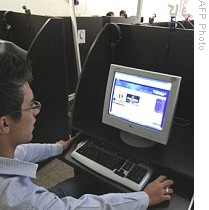Cairo
14 November 2009
 |
| An Iranian youth browses a political blog at an internet cafe in the city of Hamadan (May 2009 file photo) |
Iran's top police chief, Brigadier General Esmail Ahmadi-Moqaddam says that his organization is setting up a "cyber police division" to combat what he terms "Internet crime."
Fars News Agency reported that Ahmadi-Moqaddam complained that "Internet crime" was on the rise and that the Iranian police must "increase its capabilities to counter such violations."
Iranian law mixes activities such as theft, fraud and forgery, with more subtle and often political activities lumped together under the categories "defamation and mischief." The latter two categories have analysts worried.
Police Colonel Mehrdad Omidi, who runs the Internet crime division, stated in the Iranian press, Saturday, that what he calls "insults and spreading of lies," would be fought vigorously.
He also noted that a 12-member commission would now be involved in policing "political matters on the internet." He said , given the spread of Internet use, police must confront crimes taking police in the Web atmosphere.
Most Iranian opposition Web sites, including those of top leaders Mir Hossein Mousavi and Ayatollah Mehdi Karrubi are considered illegal and are now blocked inside Iran.
Reza Moini of Paris-based NGO Reporters Without Borders says that Iran's Revolutionary Guards are increasingly taking over internet surveillance from other government agencies:
He says that there are several points to stress: notably that when the Iranian parliament ratified the Internet law there were several institutions put in charge of surveillance, but now, with the opposition movement continuing unabated, the regime is concerned that the Internet is playing a key role in informing people and spreading information. This, he says, is where the police are becoming involved, and he says, by police, what is meant is the "Guardians of the Revolution," who are increasingly trying to seize the lead.
The Intelligence Ministry has clamped down on both the Internet and on mobile phone communications during opposition demonstrations to disrupt communications. Opposition activists complain that internet speeds were brought to dismally slow levels and that they were forced to use proxies to prevent their IP addresses from being detected.
Still, many popular opposition sites, like Mir Hossein Mousavi's Facebook Web page, get thousands of visitors daily and put out up-to-the-minute bulletins of opposition activities.
One well-known young opposition activist, Mohammed Reza Jalaiepour, who was later arrested by the government, placed this emotional confession about why he joined the opposition on Mousavi's Facebook Web site.
Reza Moini says that there are a handful of Internet activists and website creators who have been arrested by the government and are now languishing in prison.
Police Colonel Omidi insists that Iranian government authorities will intervene in political matters on the Internet if there has been an illegal act.
Iranian intellectuals and opposition activists remain in contact with each other and with the outside world by posting comments and information about their activities on Web sites both inside and outside Iran. Many complain that they live in fear of being detected by the government and arrested.